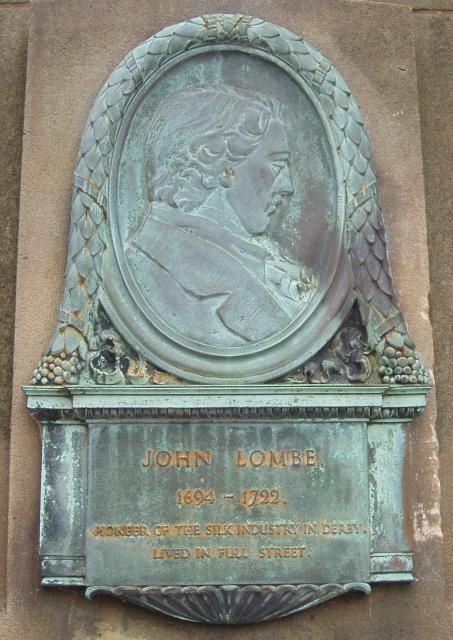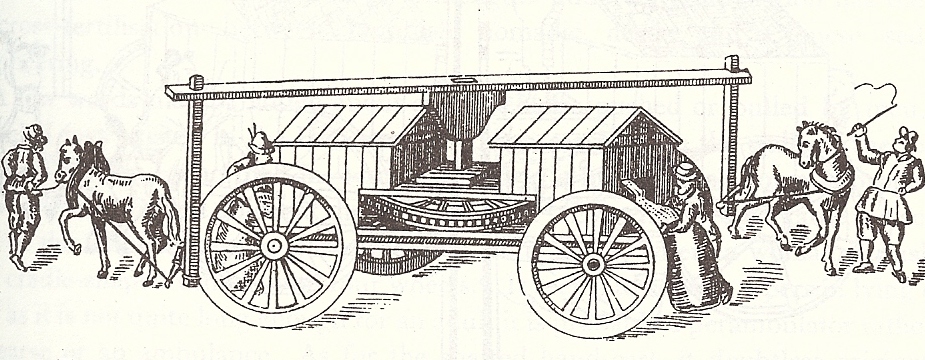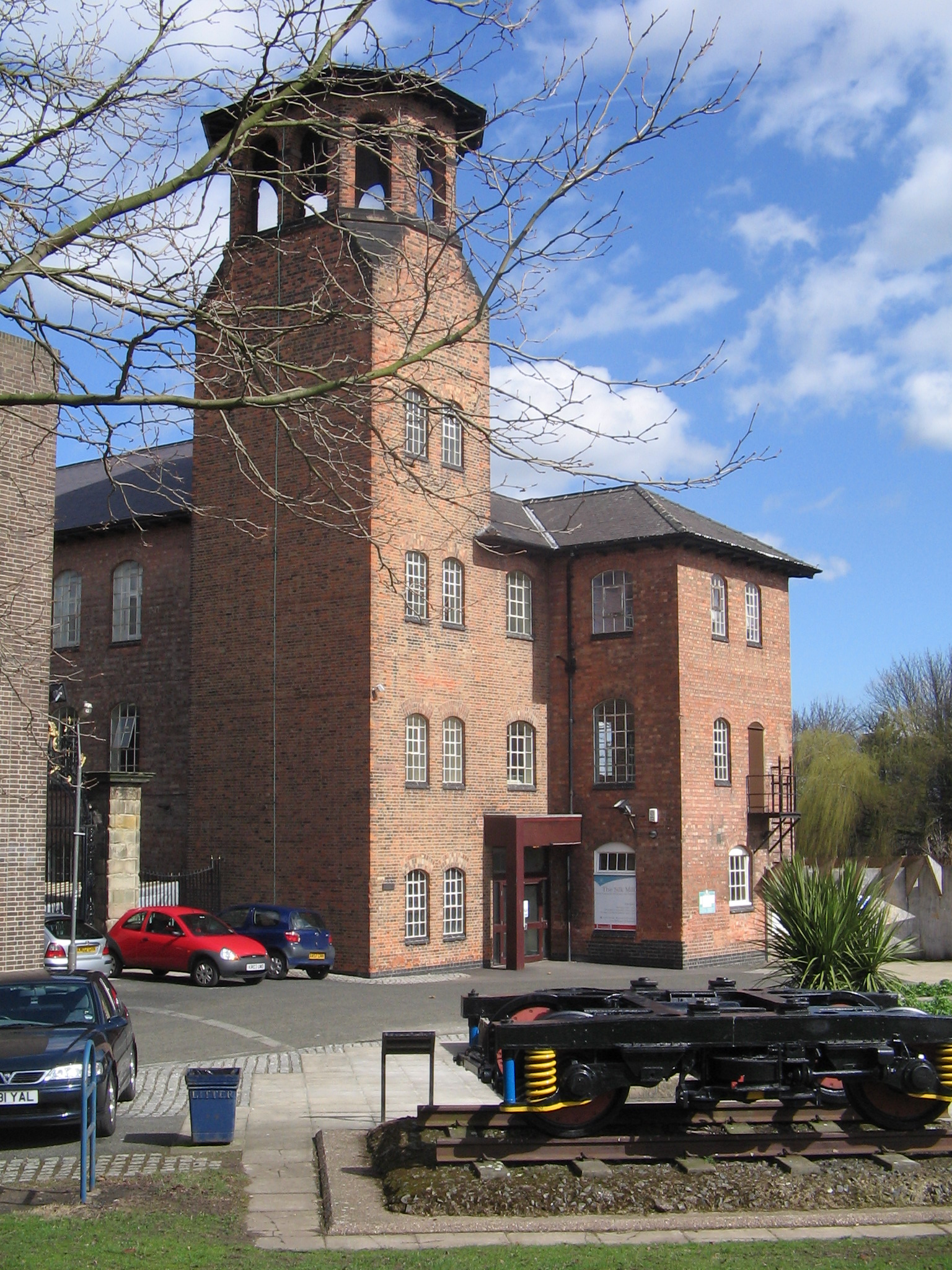|
John Lombe
John Lombe (1693 in Norwich – November 20, 1722 in Derby) was a silk spinner in the 18th century Derby, England. Biography Lombe was born in Norwich in approximately 1693, the son of a worsted weaver. He was a younger half-brother of Thomas Lombe who, after John's death, would go on to amass a fortune as a silk merchant in Norwich and London. In the early 18th century, the centre for producing silk stockings by framework knitting had moved to the Midlands from London and the demand for spun silk was outstripping supply. Lombe had obtained employment at an abortive silk mill built in Derby by George Sorocold for the silk spinner Thomas Cotchett of Derby, built on the River Derwent. The Italians had been using power spinning since the early 15th century, with a description published by Vittorio Zonca. Leonardo da Vinci had sketched a similar model, but Zonca's was more complete; it is unknown if there was contact. Lombe was sent by his brother Thomas to investigate the ... [...More Info...] [...Related Items...] OR: [Wikipedia] [Google] [Baidu] |
Exeter Bridge John Lombe
Exeter () is a city in Devon, South West England. It is situated on the River Exe, approximately northeast of Plymouth and southwest of Bristol. In Roman Britain, Exeter was established as the base of Legio II Augusta under the personal command of Vespasian. Exeter became a religious centre in the Middle Ages. Exeter Cathedral, founded in the mid 11th century, became Anglican in the 16th-century English Reformation. Exeter became an affluent centre for the wool trade, although by the First World War the city was in decline. After the Second World War, much of the city centre was rebuilt and is now a centre for education, business and tourism in Devon and Cornwall. It is home to two of the constituent campuses of the University of Exeter: Streatham and St Luke's. The administrative area of Exeter has the status of a non-metropolitan district under the administration of the County Council. It is the county town of Devon and home to the headquarters of Devon County Council. A p ... [...More Info...] [...Related Items...] OR: [Wikipedia] [Google] [Baidu] |
Vittorio Zonca
Vittorio Zonca (1568–1603) was an Italian engineer and writer. He wrote the ''Theater of machines'', which was published in Padua in 1607 four years after his death. Some of his plates were translated into Chinese by Johann Schreck and published in the 1627 Chinese book on European mechanical arts '' Diagrams and explanations of the wonderful machines of the Far West''. Works * Vittorio Zonc''Novo Teatro di Machine et Edificii'' Padua 1607. * Notes References * Arnold Pacey ''The Maze of Ingenuity: Ideas and Idealism in the Development of Technology'' MIT Press, 1992 * Francis C. Moon ''The Machines of Leonardo Da Vinci and Franz Reuleaux: Kinematics of Machines from the Renaissance to the 20th Century'' Springer, 2007 * Joseph Needham, Ling Wang, Gwei-Djen Lu ''Science and civilisation in China'' Cambridge University Press, 1965 External links * *Vittorio Zonca (1607''Novo teatro di machine et edificii per varie et sicure operationi''- digital facsimile from the Li ... [...More Info...] [...Related Items...] OR: [Wikipedia] [Google] [Baidu] |
British Textile Industry Businesspeople
British may refer to: Peoples, culture, and language * British people, nationals or natives of the United Kingdom, British Overseas Territories, and Crown Dependencies. ** Britishness, the British identity and common culture * British English, the English language as spoken and written in the United Kingdom or, more broadly, throughout the British Isles * Celtic Britons, an ancient ethno-linguistic group * Brittonic languages, a branch of the Insular Celtic language family (formerly called British) ** Common Brittonic, an ancient language Other uses *''Brit(ish)'', a 2018 memoir by Afua Hirsch *People or things associated with: ** Great Britain, an island ** United Kingdom, a sovereign state ** Kingdom of Great Britain (1707–1800) ** United Kingdom of Great Britain and Ireland (1801–1922) See also * Terminology of the British Isles * Alternative names for the British * English (other) * Britannic (other) * British Isles * Brit (other) * Briton (d ... [...More Info...] [...Related Items...] OR: [Wikipedia] [Google] [Baidu] |
People Of The Industrial Revolution
A person ( : people) is a being that has certain capacities or attributes such as reason, morality, consciousness or self-consciousness, and being a part of a culturally established form of social relations such as kinship, ownership of property, or legal responsibility. The defining features of personhood and, consequently, what makes a person count as a person, differ widely among cultures and contexts. In addition to the question of personhood, of what makes a being count as a person to begin with, there are further questions about personal identity and self: both about what makes any particular person that particular person instead of another, and about what makes a person at one time the same person as they were or will be at another time despite any intervening changes. The plural form "people" is often used to refer to an entire nation or ethnic group (as in "a people"), and this was the original meaning of the word; it subsequently acquired its use as a plural form of per ... [...More Info...] [...Related Items...] OR: [Wikipedia] [Google] [Baidu] |
Businesspeople From Norwich
A businessperson, businessman, or businesswoman is an individual who has founded, owns, or holds shares in (including as an angel investor) a private-sector company. A businessperson undertakes activities (commercial or industrial) for the purpose of generating cash flow, sales, and revenue by using a combination of human, financial, intellectual, and physical capital with a view to fueling economic development and growth. History Prehistoric period: Traders Since a "businessman" can mean anyone in industry or commerce, businesspeople have existed as long as industry and commerce have existed. "Commerce" can simply mean "trade", and trade has existed through all of recorded history. The first businesspeople in human history were traders or merchants. Medieval period: Rise of the merchant class Merchants emerged as a "class" in medieval Italy (compare, for example, the Vaishya, the traditional merchant caste in Indian society). Between 1300 and 1500, modern accoun ... [...More Info...] [...Related Items...] OR: [Wikipedia] [Google] [Baidu] |
1722 Deaths
Seventeen or 17 may refer to: *17 (number), the natural number following 16 and preceding 18 * one of the years 17 BC, AD 17, 1917, 2017 Literature Magazines * ''Seventeen'' (American magazine), an American magazine * ''Seventeen'' (Japanese magazine), a Japanese magazine Novels * ''Seventeen'' (Tarkington novel), a 1916 novel by Booth Tarkington *''Seventeen'' (''Sebuntiin''), a 1961 novel by Kenzaburō Ōe * ''Seventeen'' (Serafin novel), a 2004 novel by Shan Serafin Stage and screen Film * ''Seventeen'' (1916 film), an American silent comedy film *''Number Seventeen'', a 1932 film directed by Alfred Hitchcock * ''Seventeen'' (1940 film), an American comedy film *''Eric Soya's '17''' (Danish: ''Sytten''), a 1965 Danish comedy film * ''Seventeen'' (1985 film), a documentary film * ''17 Again'' (film), a 2009 film whose working title was ''17'' * ''Seventeen'' (2019 film), a Spanish drama film Television * ''Seventeen'' (TV drama), a 1994 UK dramatic short starring Christi ... [...More Info...] [...Related Items...] OR: [Wikipedia] [Google] [Baidu] |
1693 Births
Events January–March * January 11 – 1693 Sicily earthquake: Mount Etna erupts, causing a devastating earthquake that affects parts of Sicily and Malta. * January 22 – A total lunar eclipse is visible across North and South America. * February 8 – The College of William & Mary in Williamsburg, Virginia is granted a Royal charter. * February 27 – The publication of the first women's magazine, titled ''The Ladies' Mercury'', takes place in London. It is published by the Athenian Society. * March 27 – Bozoklu Mustafa Pasha becomes the new Grand Vizier of the Ottoman Empire, after Sultan Ahmed II appoints him as the successor of Çalık Ali Pasha. April–June * April 4 – Anne Palles becomes the last accused witch to be executed for witchcraft in Denmark, after having been convicted of using powers of sorcery. King Christian V accepts her plea not to be burned alive, and she is beheaded before her body is set afire. * April 5 – The Order of Saint L ... [...More Info...] [...Related Items...] OR: [Wikipedia] [Google] [Baidu] |
Lombe's Mill
Lombe's Mill was the first successful silk throwing mill in Britain. It was built on an island on the River Derwent, Derbyshire, River Derwent in Derby. It was built after John Lombe visited Piedmont in 1717 and returned to England with details of the Italian silk throwing machines – the ''filatoio'' and the ''torcitoio'' – and some Italian craftsmen. The architect was George Sorocold. At its height, the mill employed some 300 people. Location Lombe's Mill was built next to Thomas Cotchett , Thomas Cotchett's 1704 mill on the west bank of the River Derwent, Derbyshire, River Derwent in Derby. At this point a weir had been constructed across the river, and the mill was built on an island downstream which separated the river from the tail race of three corn mills. The tail race was also called a leat, fleam or a leat. Derby was a key location as the river had a fast flow, and it was here that it was crossed by the A6 road (England), London to Carlisle road History Lombe's ... [...More Info...] [...Related Items...] OR: [Wikipedia] [Google] [Baidu] |
Exeter Bridge - Derby
Exeter Bridge is a bridge in the centre of Derby spanning the River Derwent 200 metres south of the more modern Cathedral Green Footbridge. History Derby's original Exeter Bridge started life as a timber footbridge built by the Binghams of Exeter House, in order to access their gardens on the other side of the River Derwent. Exeter House was eventually demolished because of cost and to allow improvements to the bridge to be made. The old Exeter Bridge was demolished in 1929 and replaced by a single-span concrete bridge designed by Charles Herbert Aslin of the City Architect's Department, who was also responsible for Derby's now demolished Art Deco-style bus station. During construction a test was carried out to see if it would hold the weight of the traffic. Civil engineers ran a procession of traction engines, steam rollers and heavy lorries across the bridge to check it could take the strain. It was officially opened by the minister of transport, Herbert Morrison on 13 March ... [...More Info...] [...Related Items...] OR: [Wikipedia] [Google] [Baidu] |
Bas Relief
Relief is a sculptural method in which the sculpted pieces are bonded to a solid background of the same material. The term ''relief'' is from the Latin verb ''relevo'', to raise. To create a sculpture in relief is to give the impression that the sculpted material has been raised above the background plane. When a relief is carved into a flat surface of stone (relief sculpture) or wood (relief carving), the field is actually lowered, leaving the unsculpted areas seeming higher. The approach requires a lot of chiselling away of the background, which takes a long time. On the other hand, a relief saves forming the rear of a subject, and is less fragile and more securely fixed than a sculpture in the round, especially one of a standing figure where the ankles are a potential weak point, particularly in stone. In other materials such as metal, clay, plaster stucco, ceramics or papier-mâché the form can be simply added to or raised up from the background. Monumental bronze reliefs a ... [...More Info...] [...Related Items...] OR: [Wikipedia] [Google] [Baidu] |
Silk Throwing
Silk throwing is the industrial process wherein silk that has been reeled into skeins, is cleaned, receives a twist and is wound onto bobbins. The yarn is now twisted together with threads, in a process known as ''doubling''. Colloquially silk throwing can be used to refer to the whole process: reeling, throwing and doubling. Silk had to be thrown to make it strong enough to be used as ''organzine'' for the warp in a loom, or ''tram'' for weft. History Silk weaving is known to have been carried out in Sicily in the tenth century, and in 1474 there were 15,000 employed in the industry in Milan. There is an illustration of a circular hand-powered throwing machine drawn in 1487 with 32 spindles. The Italians called the throwing machine a and the doubler a . The first evidence of an externally powered comes from the thirteenth century, and the earliest illustration from around 1500. Bologna became the most technological advanced silk-throwing town, with driven by overhead shafts that ... [...More Info...] [...Related Items...] OR: [Wikipedia] [Google] [Baidu] |
William Hutton (historian)
William Hutton (30 September 1723 – 20 September 1815) was an English poet and historian. Originally from Derby, he moved to Birmingham and became the first significant historian of the city, publishing his ''History of Birmingham'' in 1781. Biography A Unitarian nonconformist born in Derby, William Hutton went to school when five years old. Aged seven years he was employed in a Derby Silk Mill on a seven-year apprenticeship. In 1737 he took a second apprenticeship as a stocking maker in Nottingham under his uncle. In 1746, after his uncle had died, he taught himself bookbinding, and three years later opened a shop in Southwell, Nottinghamshire. This was not successful and he moved to Birmingham in 1750 and opened a small bookshop. Hutton married Sarah Cock from Aston-on-Trent in 1755 and they had three sons and a daughter, Catherine Hutton (1756–1846), who became a writer. In 1756, Hutton opened a paper warehouse – the first in Birmingham – which became profitable. ... [...More Info...] [...Related Items...] OR: [Wikipedia] [Google] [Baidu] |



_1938.jpg)



